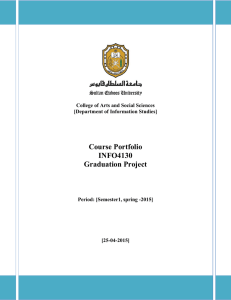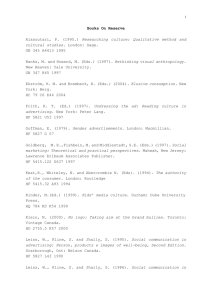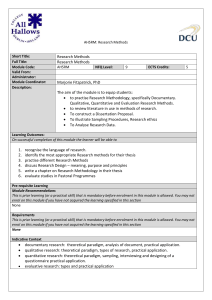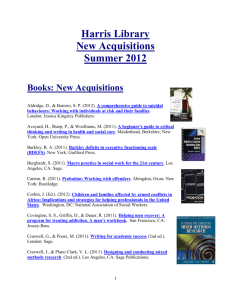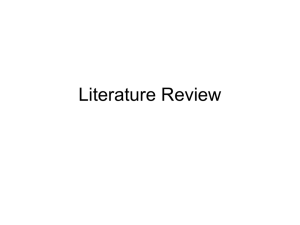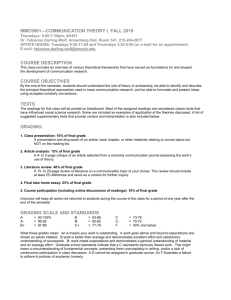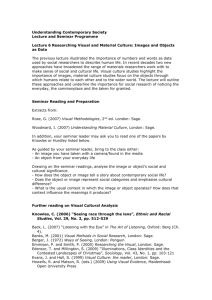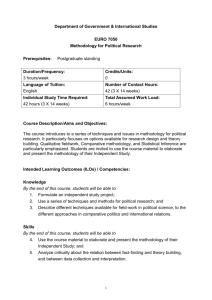Module Leader: Professor Ann Heilmann
advertisement
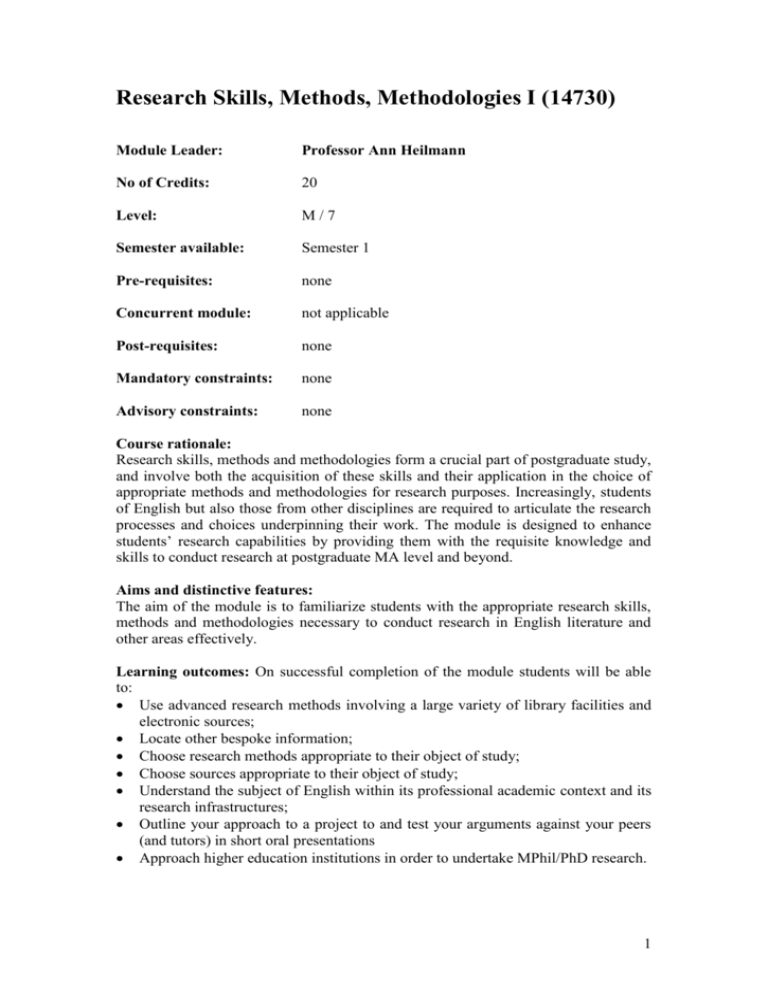
Research Skills, Methods, Methodologies I (14730) Module Leader: Professor Ann Heilmann No of Credits: 20 Level: M/7 Semester available: Semester 1 Pre-requisites: none Concurrent module: not applicable Post-requisites: none Mandatory constraints: none Advisory constraints: none Course rationale: Research skills, methods and methodologies form a crucial part of postgraduate study, and involve both the acquisition of these skills and their application in the choice of appropriate methods and methodologies for research purposes. Increasingly, students of English but also those from other disciplines are required to articulate the research processes and choices underpinning their work. The module is designed to enhance students’ research capabilities by providing them with the requisite knowledge and skills to conduct research at postgraduate MA level and beyond. Aims and distinctive features: The aim of the module is to familiarize students with the appropriate research skills, methods and methodologies necessary to conduct research in English literature and other areas effectively. Learning outcomes: On successful completion of the module students will be able to: Use advanced research methods involving a large variety of library facilities and electronic sources; Locate other bespoke information; Choose research methods appropriate to their object of study; Choose sources appropriate to their object of study; Understand the subject of English within its professional academic context and its research infrastructures; Outline your approach to a project to and test your arguments against your peers (and tutors) in short oral presentations Approach higher education institutions in order to undertake MPhil/PhD research. 1 Learning and teaching strategy: Learning will take place through a mixture of seminars, presentations, small-group work, library-based tuition, and independent learning. Arrangements for revision and private study: Since assessment will be by coursework only, arrangements for revision only apply where students fail the coursework. In such cases, students will be given tutorial access to a tutor (minimum: up to two hours) by arrangement to guide them in their revision. Assessment strategy: You will be assessed through three items: a. a research report (2,000 words) on one of the presentations given in the English research seminar series (for details see below) (50%) b. a 10 minute (note-based but otherwise freely delivered) presentation on a topic of your choice, either related to your dissertation topic or to one of the core aspects of your MA course. The presentation should include a brief discussion of your rationale (aims) and the method(s) used in researching for this topic, as well as a summary of the outcomes. (You may, for example, report back on how you researched an essay for one of your MA modules, describing any problems you encountered and the way you addressed these, and discussing the effectiveness - or otherwise - of particular research methods used in the process. What have you learnt from this experience that will be relevant for your future studies?) (20%) c. a write-up of your presentation with an evaluative summary (2,000 words) which critically reflects on the presentation and the brief discussion that ensued from it. (30%) Research Report The Research Report is meant to prepare you for gaining academic presentation skills through observation and critical reflection, prior to practicing these skills in both Research Skills modules. The Research Report consists in ‘writing up’ your response to and reception of one of the research presentations made during the English research seminar series. Regular attendance of the English research seminars (Mondays 4.30-6) is expected of you in both semesters. Students enrolled on the MA Women and Gender in Literature may also wish to attend Gender Studies research seminars (usually Wednesday afternoons). Make careful notes during the seminar and bear in mind the numbered points below. Include the following in your Report: a summary of the content and argument of the presentation; a note on how the speaker defined the distinctiveness of her/his presentation within the chosen field of research; a discussion of the effectiveness (or otherwise) of the speaker’s presentation techniques, including engagement (eye contact etc) with the audience, the use of handouts, audio-visual aids, Powerpoint, etc. a commentary on the strengths or achievements of the presentation and argument as you saw them; a commentary on the weaknesses or limitations of the presentation and argument as you saw them; 2 a concluding comment on how effectively the speaker, in your view, achieved her/his aims. The Report can be written in continuous prose. There is no need to number the points as above, as long as each of the points listed is covered. Your Report should not exceed 2,000 words. Method of re-assessment: Students can re-submit only once for this module. Students will be re-assessed through a. a Research Report, and b. a 3000-word essay in which they will critically analyse how at least two different research methods will impact differently on the kind of research and research outcomes they might undertake on a topic of their choice, either related to their dissertation topic or to one of the core aspects of their MA course. Estimated no. of students: 10 Indicative content: The module will be organized along the following topics: Introduction to research methods Identifying and accessing resources in libraries and archives Referencing and stylesheets Textual methods Interviewing Auto/Biographical methods Ethnographic methods Presentation techniques Indicative bibliography: Course text: Griffin, Gabriele, ed. (2005) Research Methods for English Studies. Edinburgh: Edinburgh University Press. Clifford, James and George E. Marcus, eds (1986) Writing Culture: The Poetics and Politics of Ethnography. Berkeley: University of California Press. Denzin, Norman K. and Yvonna S. Lincoln, eds (1998) Collecting and Interpreting Qualitative Materials. London: Sage. * Dunleavy, Patrick (2003) Authoring a PhD: How to Plan, Draft, Write and Finish a Doctoral Thesis or Dissertation. Basingstoke: Palgrave Macmillan. Flynn, Elizabeth A. and Patrocinio P. Schweickart, eds (1986) Gender and Reading: Essays on Readers, Texts and Contexts. Baltimore: Johns Hopkins University Press. * Gibaldi, Joseph (2003) MLA Handbook for Writers of Research Papers. Sixth edition. New York: Modern Language Association of America. Gluck, Sherna Berger and Daphne Patai, eds (1991) Women’s Words: The Feminist Practice of Oral History. New York: Routledge. * Grix, Jonathan (2004) The Foundations of Research. Basingstoke: Palgrave Macmillan. Hudson, Pat (2000) History by Numbers: An Introduction to Quantitative Approaches. London: Arnold. 3 * Kane, Eileen (1997) Doing Your Own Research: Basic Descriptive Research in the Social Sciences and Humanities. London: Marion Boyars. Maynard, Mary and June Purvis, eds (1994) Researching Women’s Lives from a Feminist Perspective. London: Taylor and Francis. Pearce, Lynne (1997) Feminism and the Politics of Reading. London: Arnold. Pratt, Mary Louise (1992) Imperial Eyes: Travel Writing and Transculturalism. London: Routledge. Silverman, David (2001) Interpreting Qualitative Data: Methods for Analysing Talk, Text and Interaction. 2nd edition. London: Sage. Silverman, Kaja (1983) The Subject of Semiotics. Oxford: Oxford University Press. Stanley, Liz (1992) The Auto/biographical I: The Theory and Practice of Feminist Auto/Biography. Manchester: Manchester University Press. Steedman, Carolyn (2001) Dust. Manchester: Manchester University Press. Swindells, Julia, ed. (1995) The Uses of Autobiography. London: Taylor and Francis. Titscher, Stephan et al. (2000) Methods of Text and Discourse Analysis. London: Sage. Wengraf, Tom (2001) Qualitative Research Interviewing: Biographic Narrative and Semi-Structured Methods. London: Sage. Wodak, Ruth and Michael Meyer, eds (2001) Methods of Critical Discourse Analysis. London: Sage. Wolcott, Harry F. (2001) Writing Up Qualitative Research. Second edition. London: Sage. 4
